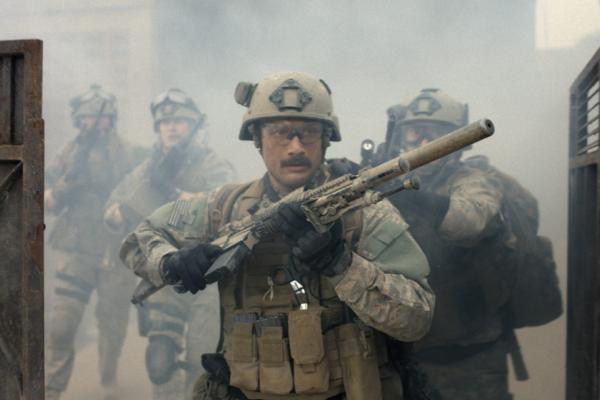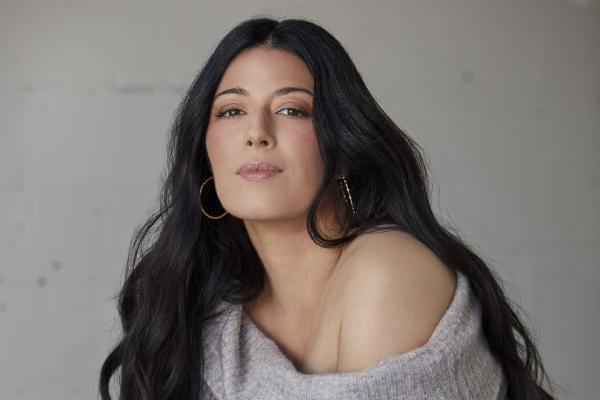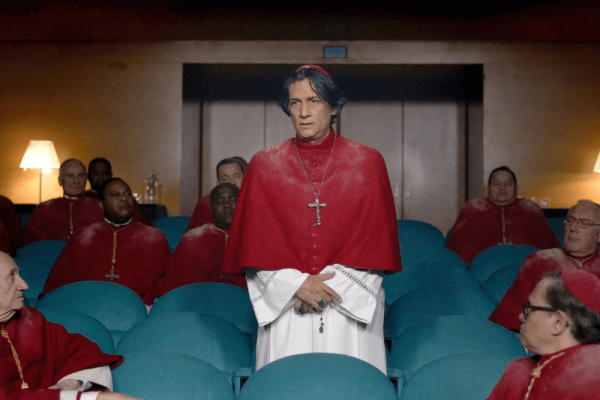The Many is an indie folk/gospel, liturgically-grounded worship band that creates music for people to sing together. Assistant Web Editor Christina Colón spoke with producer Gary Rand, manager and writer Lenora Rand, and lead singer Darren Calhoun, to learn more about how The Many is creating liturgies that speak to issues of injustice and leave room for lament.
This interview has been lightly edited for length and clarity.
Christina Colón, Sojourners: How did your group come together?
Lenora Rand, The Many: Gary and I worked for many years at LaSalle Street Church in Chicago. [Gary was] director of worship in the arts there and music was a big part of that role. And so, we started writing a lot of songs while Gary was doing that job. We had been writing a bunch of songs really trying to articulate our faith and feelings about what was going on in the world. At the same time, we began this broader kind of group called the Plural Guild, which was to bring together artists who were writers and musicians who were also trying to create resources for more progressive churches. So, as we continued writing the songs, we talked about well, it'd be nice to share these songs, so we need some people to sing them. So really, the group came together with a decision, an intention of bringing folks together who would love to sing these songs. For six months or a year, the group was a little bit in flux with people coming in and out and then it solidified. I'd say about three years ago, the group started seeing themselves as the group — really doing life together, traveling together, and singing more at churches. So, it really started around the songs, but has grown into this group which has pushed each other and helped each other grow, and the songs have grown with us.
Colón: I noticed that in your introduction, you write that you're a liturgically-grounded group. Can you talk to me about what it means to be liturgically-grounded?
Gary Rand, The Many: You know the original idea of the Plural Guild that Lenora talked about, was worship renewal. It was to help churches [with] the experiences that we had been having in our own church — where the kinds of theologies that were developing and the commitments we were making as congregations were not always supported by the words we were saying in church and the songs we were singing. We decided to think about trying to create resources to serve those churches who needed new materials, new liturgies, and new songs to sing. The songs came out of that motivation. We purposely pretty much always create liturgies to go with the songs. I don't think we've ever done a concert. I think we've always created these worship services where the songs are embedded in the framework of prayer, scripture, and storytelling and even some performance art. Creativity is another one of our goals. We're trying to find new creative ways to do worship.
Colón: Building on that, what do you see as the role of music in the church?
Gary Rand: That’s a very big question. It has as many roles as there are people, because people use music in different ways based on who they are and what they're experiencing. You know for the people who are in our congregations, music certainly embodies our theology. That's one of the reasons that we're very interested in it in terms of worship renewal. One of my favorite passages is Deuteronomy 31 and 32 where God comes to Moses and Moses is all worried about what's going to happen to the people of Israel after he leaves, and God comes to Moses and says, 'write a song — this song will live in the community.' I think a lot of that is songs also give us memory of who we are. Songs create a sort of identity. Singing together bonds us together in community. It can challenge us, it can give us inspiration when we need courage, and it can move us to healing when we're sick. It has all these different functions in the church.
Colón: A lot of "church music" is often characterized as praise music or worship music. What do you think of these identifiers and how do you navigate them?
Darren Calhoun, The Many: I lead worship at a church called Urban Village and it is a United Methodist Church that has an evangelical feel. By that I mean it's a contemporary service and people are very casual. So, you get this kind of mash-up of expectations: Is it going to be high church? Is it going to be very liturgical? Is it going to be like an evangelical church where it's very contemporary? Our church navigates that by giving them a very broad range of styles, musical tastes, and genres. When it comes to these classifications, whether it's this song is a worship song versus this song is a praise song, I think we're grasping at how to describe the music. Sometimes we probably put more weight on it than is necessary. I think music that is meant to glorify God comes out in a wide variety of expressions. For us, our music crosses so many of those things that people tend to describe us in whatever way resonates most with them. For some people, we’re a great praise band and other people are like, 'oh I'm so glad [you aren’t] another praise band.' I think because we [have a] very different approach, it just resonates and makes sense to them. No one ever describes us in the same words.
Colón: I noticed in some of your material, you say that you’re "creating the kind of music we need now more than ever." What does that mean? What kind of music are you saying people need at this moment in time?
Lenora Rand: I think that as a writer, you write what you yourself need to read. I always look at what we're doing [as listening to] people around me and hearing what they need to give voice to. We've written a lot of songs that fall into more of a lament category. I think that it's been a very rough few years. People have needed to be able to express their laments and speak more openly and honestly about what's going on in the world around us and cry out to God and say, ‘What the heck is going on here.’ So, we really tried to write a lot of songs that do that. I think that one of the things you often find [in the praise and worship category] is that songs feel a little bit, I'm not trying to be critical, but they don't feel very honest or real and they don’t allow any space for doubt or questions or really address the contemporary issues we're seeing around injustice, inequality, and the refugee crisis, and those sorts of things. Exclusion is a huge thing going on in our world. We wanted to be able to write songs that were not just able to talk about those things, but also do them through poetry and in a way that was not just personally confessional, but really gave voice to congregations and groups of people to say some of that stuff out loud together.
Calhoun: I could add to that there’s also a very practical element to the life of church right now. If you look at the Pew Research and attendance numbers at churches, a lot of churches are experiencing a decline in the U.S. People have grown more doubtful and distrustful. We've had all kinds of church scandals like #ChurchToo and people are tired of just coming to church and being expected to put on this happy face and pretend everything's OK and then going back home to their chaos. And so, what we've seen in our gatherings, is we have just as many people who are seven day a week committed to church sitting right beside people who have given up on church and who feel that they are done with institutional gatherings, but who still are longing for Christ, longing for the experience of the spirit. And they find that the music and the gathering gives them space to be a part of that and to feel connected to that deeper longing that they have. Maybe they can't engage with church right now, but they do feel like they can engage in some kind of significant way with the gatherings that we create. And I think that is something that is important to us.
Colón: You all have different identities and experiences that you bring to the group and to the music that you create. Musically, how do you engage those identities and experiences and how do you navigate that line of vulnerability?
Gary Rand: I think when we were talking in those early stages about putting people together to be in the group, you know we were sort of casting a net a little bit. I have to say that it really affirmed my belief in God, because God really sent us exactly the right people. We wanted it to be multicultural and we wanted it to be multi-racial and we wanted it to reach out to other groups like LGBTQ [people], and we wanted to be the kind of group that would have a natural presence in those spaces. We also wanted our music to reflect that diversity. We didn't want to sound like just gospel or just contemporary Christian or just folk music, we wanted to have input from different voices and experiences. That's why we called the group The Many. Right from the very beginning when we were naming the group, we wanted to have many voices and to have a way of expressing many voices. That’s not easy, but it's been one of the most rewarding parts of it for me.
Calhoun: The word that I would use to encapsulate what we do is vulnerable. We don't hide a whole bunch. We bring our whole selves. And while that may be unnerving and uncomfortable for many, it's also I think something that we deeply long for. For me personally, I hold identities that have been marginalized. I'm a black man who lives in the United States of America. For us to have a song that references the line, "I can't breathe," is incredibly profound and powerful. For us to just be able to sing and cry out to God together in ways that don't shy away from the ways that some of us are marginalized, it's so important. Our Song, “All Belong Here,” is another song that [emphasizes] this idea of belonging when so many LGBTQ people have been specifically told they can't have communion because of their gender identity or sexual orientation. Then for us to sing the song, that just affirms over and over that all belong here. Then for that to be lived out. I'm also a gay man and that's not a secret and it's not something that we dance around. For me to be there, to bring this music to people who as an entire group have been told that they don't belong in churches, it resonates in ways that are way deeper than ‘ooh I really liked that chorus.’ It speaks to my soul. I always think about God speaking to Abraham and saying, ‘look at the stars of the sky, I've numbered these for you.’ And if God could show Abraham back then that Darren was part of God's number regardless of my racial identity, regardless of my sexual orientation, then I think the music that we produce should show that to other people.
Got something to say about what you're reading? We value your feedback!







